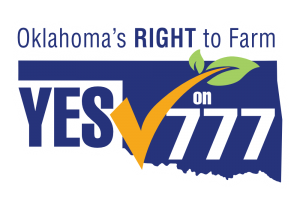OKAgPolicy Today is a morning email containing the day’s top agriculture and policy headlines. The inclusion of a particular story does not equal an endorsement. Subscribe to the email here.
 SEVEN FACTS ABOUT STATE QUESTION 777
SEVEN FACTS ABOUT STATE QUESTION 777
State Question 777 creates a unique opportunity for Oklahoma voters to protect one of our state’s greatest strengths – the family farm. Below find seven facts about Oklahoma’s Right to Farm [Yes On 777].
TOP HEADLINES
Why family farmers support Oklahoma’s Right to Farm:
This November, we have to chance to stand up to out-of-state interests and vote to keep food grown here in Oklahoma both abundant and affordable,” says Jessica Wilcox, Major County family farmer [Yes On 777].
Farmers push back on social media against negatives on State Question 777 raised by HSUS:
The Humane Society of the US continues the campaign against State Question 777- and have sent multiple emails in recent days to their email list in Oklahoma, calling for a “no” vote. The themes that HSUS is using in their call for a vote against Right to Farm have not changed [Oklahoma Farm Report].
STATE
Alternatives for produced water studied at Capitol:
Kalt owns Fairmont Brine Processing, a West Virginia-based company that developed a process to turn toxic, chemical-laden wastewater into potable water and industrial-grade salt. He was one of two people who presented alternatives to disposal Tuesday at a House Energy and Natural Resources interim study [Journal Record].
School funding report undermines Oklahoma critics (editorial):
While Oklahoma’s school funding may not be ideal, that’s true of most states. Next month, it’s important that voters make informed policy decisions based on a comprehensive review of the data, not political arguments that are most notable for their omissions [The Oklahoman].
FEDERAL
Science Committee Chair: EPA gave misleading testimony on herbicide study:
House Science Committee Chairman Lamar Smith (R-Texas) on Tuesday accused Environmental Protection Agency Administrator Gina McCarthy of giving misleading testimony on an international study on the safety of the widely used herbicide glyphosate [Morning Consult].
The prickly political path for new infrastructure investments:
The pace of building new infrastructure and repairing the old is proceeding more robustly than most people observe, yet is also likely to quicken in the years ahead. What’s more, the sources of infrastructure funding and what Americans mean by infrastructure are both destined to become more diverse [Agri-Pulse].
Will estate tax crackdown hold up in court?:
If the IRS finalizes a proposal to crack down on a tactic that family-owned companies and partnerships use to reduce the value of their assets and avoid paying the estate tax, litigation is sure to follow — and plaintiffs suing the agency are likely to prevail, predicts Roger McEowen, the Kansas Farm Bureau Professor of Agricultural Law and Taxation at Washburn University School of Law, in Topeka [Politico].

